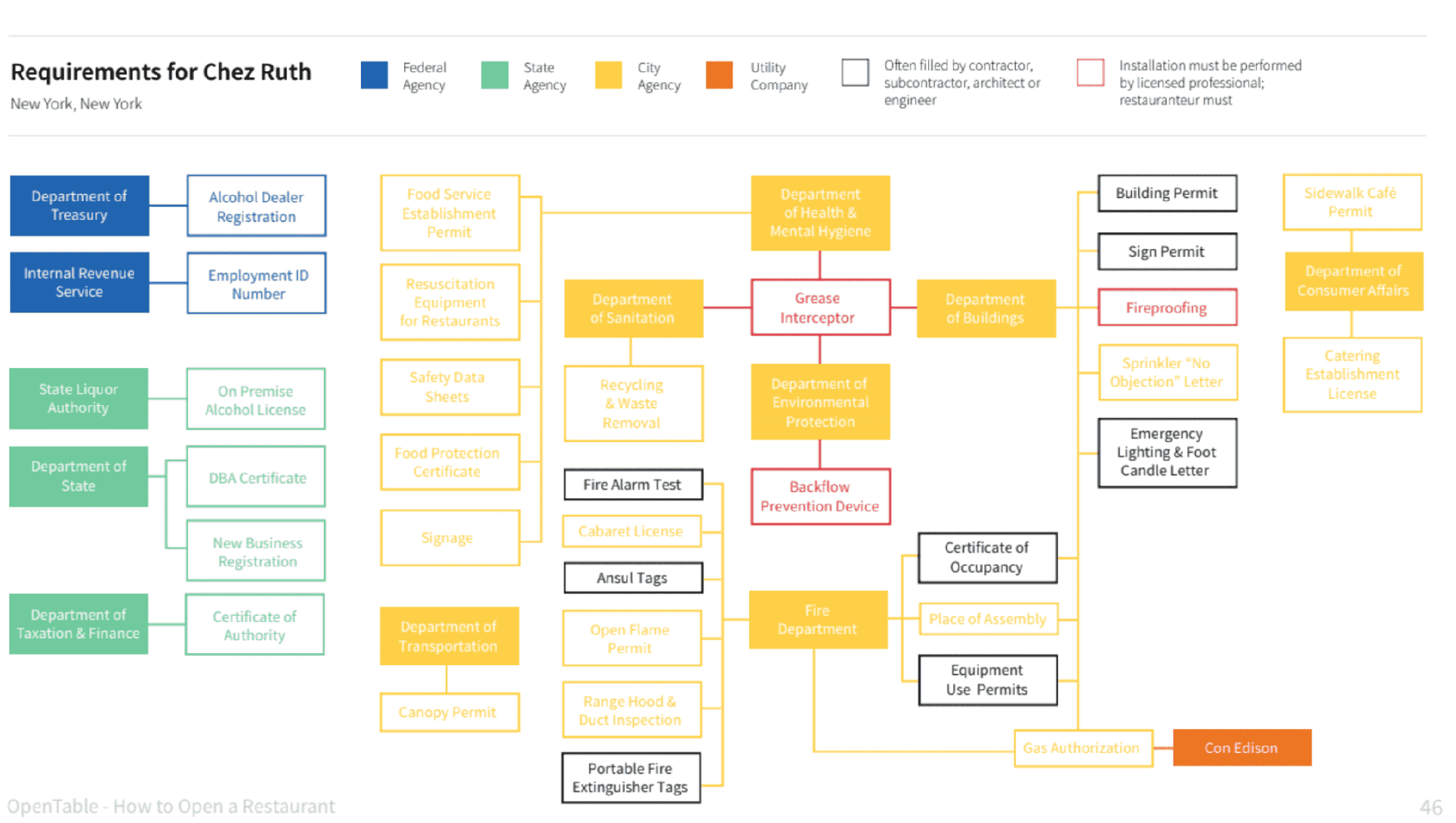The information provided in this article does not, and is not intended to, constitute legal or financial advice; instead, all content is for general informational purposes only. Information in this article is presented “as-is” and may not constitute the most up-to-date information. All liability with respect to actions taken or not taken based on the contents of this article is hereby expressly disclaimed.
How to Deal with Legal Regulations Affecting Your New Restaurant
There’s no universal checklist for all of the necessary licenses, permits, inspections, postings, and signage for your new restaurant. These requirements vary greatly between states, cities, restaurant types, and even counties and neighborhoods. The experts that you’ve hired to help you — specifically your designer, architect, and contractor — will help you get through everything, but you’ll need to be an active part of the process and take on responsibility as well.
Here, we’ll discuss 10 best practices to help you obtain everything you need to open your restaurant legally from the get-go, and then we’ll map out a case study to show you the licenses, permits, certificates, and inspections needed to open a (fictitious) new restaurant in New York City.
1. Review your lease in detail
Before you sit down with your team and put together a master list of action items, review your lease in detail so you have a clear understanding of what your landlord will be responsible for, as well as the duties that fall on you, the tenant.
If your lease states that your landlord is responsible for trash removal, they may be required to post a decal showing which company they use and what the pick-up schedule is. Make this your first step to avoid confusion and help facilitate a healthy, productive, and accountable relationship between you and your landlord.
2. Draw on the experience of your team
Your contractor, designer, engineer, architect, and kitchen equipment vendor will be your most valuable allies in getting all of your licenses, permits, inspections, and postings completed properly. Gather this team and ask them to provide you with a list of everything that they know you’ll need, as well as areas of uncertainty so that you know where you’ll need to do focused research.
Chris Zeman of Zeman Construction says, “You need to have a team established that has experience, otherwise there’s going to be a lot of surprises and unmet expectations throughout the process. For the person that’s just going through this for the first time, it’s going to feel like an infinite list and like there are so many people that have their hand out that need to get paid for some sort of application, license, or permit.”
3. Learn your city
Some municipalities are much more organized than others when it comes to providing practical, accurate information and resources to help you better understand what’s required for you to open and operate your business. Cities like San Francisco and New York have relatively advanced online resources, while others may have nothing at all.
Still, Jennifer Murri of New York City’s AltaMarea Group cautions that even the most sophisticated online tools are only a starting point. If your city doesn’t have a centralized Internet resource for new businesses, they likely have an office you can call or visit to get the same information.
Track down the information up front to avoid delays and surprises. Remember, investing a day at your municipal office early in the process can save you weeks or months of costly setbacks down the road.
4. Research the requirements of each individual city agency
Do independent research online, by calling or visiting the major city and state agencies you will need to obtain permits from, and by asking peers with similar concepts in your market what they need to get their doors open.
Jennifer says, “It’s really important to understand that city agencies don’t communicate with each other. In New York City, for example, you need a Certificate of Occupancy from the Department of Buildings and from the Fire Department and there’s no link between the two.”
Once you’ve visited centralized websites, make sure you’re then researching the requirements of each individual agency. For example, Jennifer adds, “Grease traps are monitored by New York City’s Department of Environmental Protection, but also the Department of Health, Department of Sanitation, and Department of Buildings. They all have different rules that you can be issued violations for, so you need to understand the requirements of each.”
5. Make a master list, assign responsibilities and follow up
Once you’ve consulted every available resource and done as much research as you can, sit with your team and compile a master list of every permit, license, inspection, and posting you’ll need. Delegate each item to a member of your team and assign due dates as necessary. In your weekly construction meetings, update each other on relevant progress, ask questions, and work together to get through inevitable setbacks and complications.
6. Get comfortable with the health code in your municipality
Department of Health (DOH) requirements vary greatly from state to state and city to city, and many DOH specifications will dictate how parts of your restaurant will need to be designed. Jennifer says, “Once you know where you’re going to open a property, contact the Department of Health for your municipality and read the entire health code so that you don’t get in too deep without knowing the regulations.
Once they start pouring concrete and putting pipes in, it’s done.” She warns that even though a lot of standards are consistent across the country, there are some things that are drastically different, like outdoor seating regulations. “The Department of Health really drives so much of the construction for your kitchen, back of house, and outdoor seating areas,” says Jennifer. “You need to be in sync with whatever the regulations are in your specific location.”
7. Keep all of your finalized documents in a centralized location
Some permits and licenses will need to be posted in a place where they are visible to guests and employees, and others will need to be kept on site and presented to inspectors before and after you open. Jennifer recommends keeping copies of everything in one centralized binder that the General Manager of the property has access to so there’s no confusion when inspectors arrive. This will also make it easier to replace expired permits and keep track of renewal dates.
8. Calendar renewal dates immediately
As soon as you receive any type of license or permit, put a reminder on your calendar for the appropriate renewal date, as well as a reminder a few weeks or months before the actual date. Clearly delegate and note on the reminders who is responsible for each renewal and assign one person (probably your General Manager) to follow up as important dates approach.
9. Include health code and food handling safety in employee training
Some states require every employee on staff to go through food safety training, while others only require certain individuals to go through it. Even if your municipality doesn’t demand that every person carry a food safety card, Jennifer recommends ensuring that every employee has some level of food handling and safety training.
She says, “This creates a safer environment for staff and guests and also helps us maintain our equipment. If employees have knowledge about their workstation, how it needs to be set up, and how equipment needs to function in order to align with code, they’re better equipped to understand when something is failing. This helps us avoid huge violations for the restaurant, as well as damage to major equipment.”
Even if the law doesn’t require it, having a staff that’s knowledgeable and responsible about food safety will help shield you from the liability of an unfortunate mistake and help you sleep at night, knowing your team knows the basics.
10. Set up service contracts right away
Before your contractor and subcontractors disappear, bring in your equipment service vendors and set up maintenance contracts. Jennifer does this for all of AltaMarea’s restaurants as a preventative maintenance measure to make sure they don’t rack up massive emergency service bills when equipment breaks. It’s very expensive to call for service at night and on weekends, which are most restaurants’ primary operating hours.
Once these appointments are completed, Jennifer negotiates service contracts, calendars the dates for their visits, and always follows up with them before and after they come in. She says, “I have to keep in touch with them to make sure that they’re holding up their end of the bargain. When I started doing this, I noticed that we had these contracts in place but no one was really monitoring whether their work was being completed.”
Licenses, Permits, Inspections and Certificates
Below, you’ll find a chart that shows the primary permits, licenses, inspections, and postings required to open a fictional restaurant called Chez Ruth, located in New York City. It’s important to note that this is far from an exhaustive list and that the requirements and agencies involved in these approval processes in New York may be very different from your municipality.
We chose to use New York City as an example because it has some of the most stringent and exhaustive permitting policies in the United States. The information is intended to demonstrate that there are a lot of items to sort through, and many of them will have requirements from or need to be inspected by multiple agencies. Also, the test case will give you an overall sense of what you should expect from your own licensing and permitting process.
TEST CASE: Chez Ruth
Here’s some basic information about Chez Ruth that helped us determine what they would need:
- City/State: New York, New York
- Neighborhood: Upper East Side
- Number of seats: 90
- Catering: Onsite and offsite
- Business type: LLC
- Chain or independent: Independent
- Leased or owned: Leased
- Outdoor dining: Yes
- Historical building: No
- Delivery service offered: No
- Candles in dining room: Yes
- Number of employees: 65

Posted Signs Required for Chez Ruth
The following list shows New York City’s posting requirements, including where in your restaurant each item needs to be displayed and where a new restaurateur could obtain these items.
Some of the documents in this list also appear on the permits and licenses chart and some do not. The ones that appear twice are permits, licenses, or proofs of inspection. The ones that only appear on the posting requirements list are informational, instructional, or cautionary signs, most of which can be purchased online or made.
Source: www.nyc.gov
OUTSIDE
Letter Grade – NYC Department of Health
Must be in view of your potential customers outside your establishment
Private Carter Decal – NYC Department of Sanitation
Must be inside window or on door facing out
Sidewalk Café License – NYC Department of Consumer Affairs
Inside window facing out
CUSTOMER AREA
Certificate of Occupancy – NYC Department of Buildings
Otherwise must have Temporary Certificate of Occupancy
THROUGHOUT PROPERTY
No Smoking – NYC Department of Health
In every room and stairwell
Must Wash Hands – NYC Department of Health
Above all hand sinks
In languages of workers and customers
Exit and Direction to Exit
Installed by contractor
Fire Extinguisher Inspection Tags
Get from contractor
On each unit showing date of last annual inspection
- Food Service Establishment Permit – NYC Department of Health
- Choking First Aid – NYC Department of Health. In language of workers and customers
- CPR Kit and Information – NYC Department of Health. Includes 911, your kit’s location, and where to learn CPR
- Sales Tax Certificate of Authority – NY State Department of Taxation
- Place of Assembly Certificate of Operation and Permit – NYC Departments of Building and Fire
- Maximum Occupancy for Place of Assembly – NYC Department of Buildings
- Liquor License – NY State Liquor Authority
- Warning for Pregnant Women – NYC Department of Health
- No Liquor Sold to Minors or Intoxicated Adults – NY State Liquor Authority
KITCHEN
- Food Allergies – NYC Department of Health. In view and in languages of all workers
- Fire Alarm Test Record – NYC Department of Fire
- Equipment Use Permits – NYC Department of Buildings, Fire. On each system and updated with inspection records. Get from Departments
- Schematic of Hood and Ducts – NYC Department of Fire. Get from contractor
- Record of Cleaning – NYC Department of Fire. On each system and update every three months. Get from contractor
- Record of Inspecting Hood and Duct – NYC Department of Fire. On each system and updated every six months. Get from contractor
WORKER AREA
- Minimum Wage – NYC State Department of Labor
- Fair Labor Standards Act – US Department of Labor
- Benefits and Hours – NY State Department of Labor
- Wage Deductions – NY State Department of Labor
- Tips and Taxation – NY State Department of Labor
- Unemployment Insurance – NY State Department of Labor. Get from insurer
WASTE AREAS
- Recycling Instructions – US Department of Sanitation
- Private Carter Information and Schedule – NYC Business Integrity Commission. Get from waste contractor
- Workers’ Compensation – NY State Department of Labor. Get from insurer
- Occupational Safety – US Department of Labor
- Right to Know Workplace Hazards – NY State Department of Labor
- Equal Opportunity – US Department of Labor
- Pregnancy Rights – NYC Human Rights Commission
- Anti-Discrimination – NY State Department of Labor
- Employment of Ex-Criminals – NY State
- Veterans Benefits – US Department of Labor
- Disability Benefits – US Department of Labor
- Polygraph Protection Act Notice – US Department of Labor
- Employee Voting Leave – NY State Board of Elections
- Permitted Working Hours for Minors – NY State Department of Labor. Create for each employed minor
- Family Medical Leave Act – US Department of Labor
Key takeaways
Do your research. Contact the people in your city and state and ask what you need based on your specific project. Get on top of scheduling critical inspections with long lead times right away.
Take advantage of your team’s experience, but don’t disengage from the process. Surround yourself with people that have done this before and take an active role yourself.
Get (very) comfortable with Department of Health regulations in your municipality. The DOH dictates many aspects of construction, kitchen design, and even how your service stations should be set up. Educate yourself on the requirements of your specific area and ensure that your GC and designer are on top of it, too.
Once you’ve invested the time and money to get your initial licenses and permits, make a plan for renewal immediately so that you never fall out of compliance.
Use service contracts for routine maintenance of major equipment and systems to reduce costs by avoiding emergency service calls.




